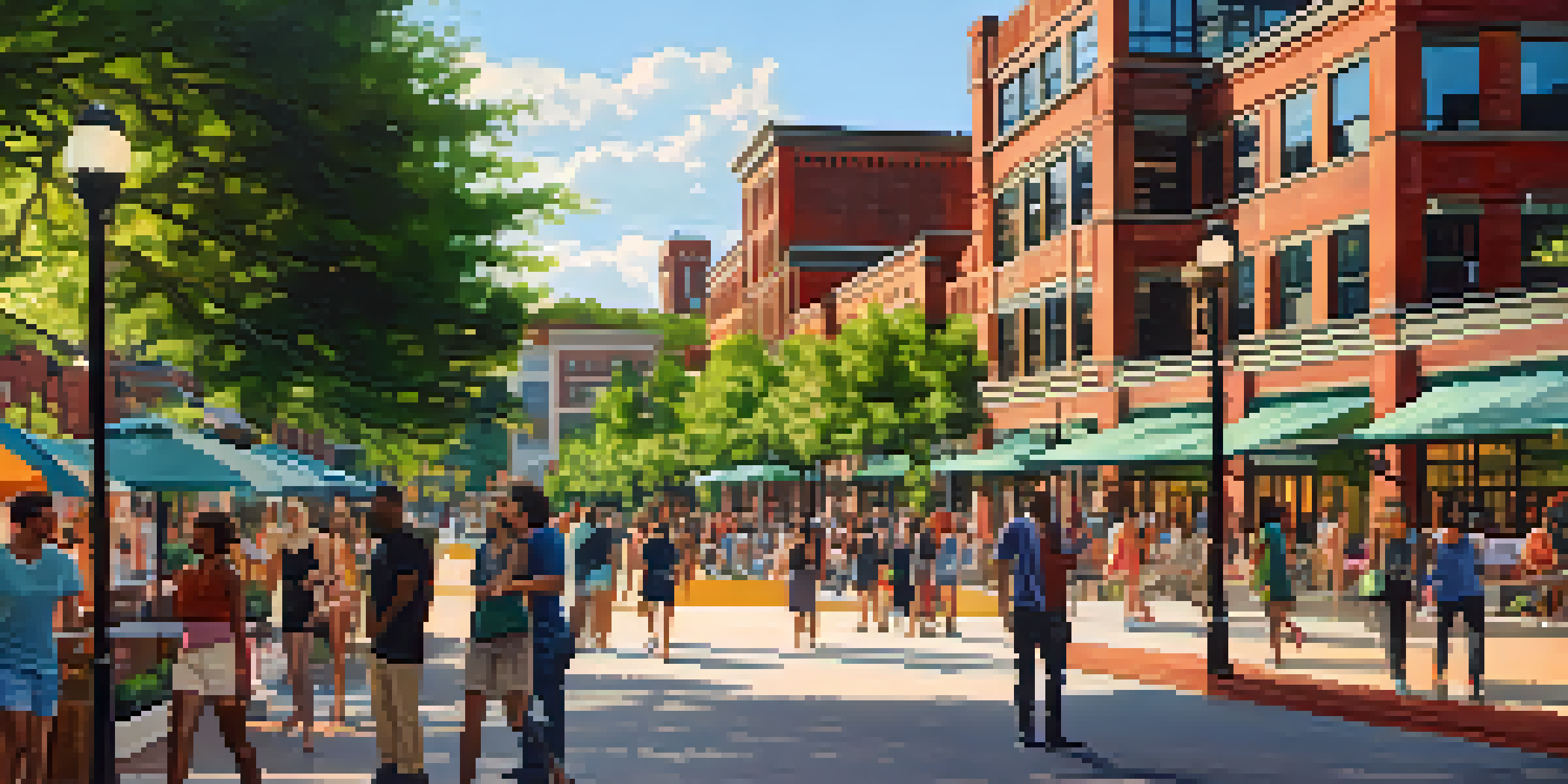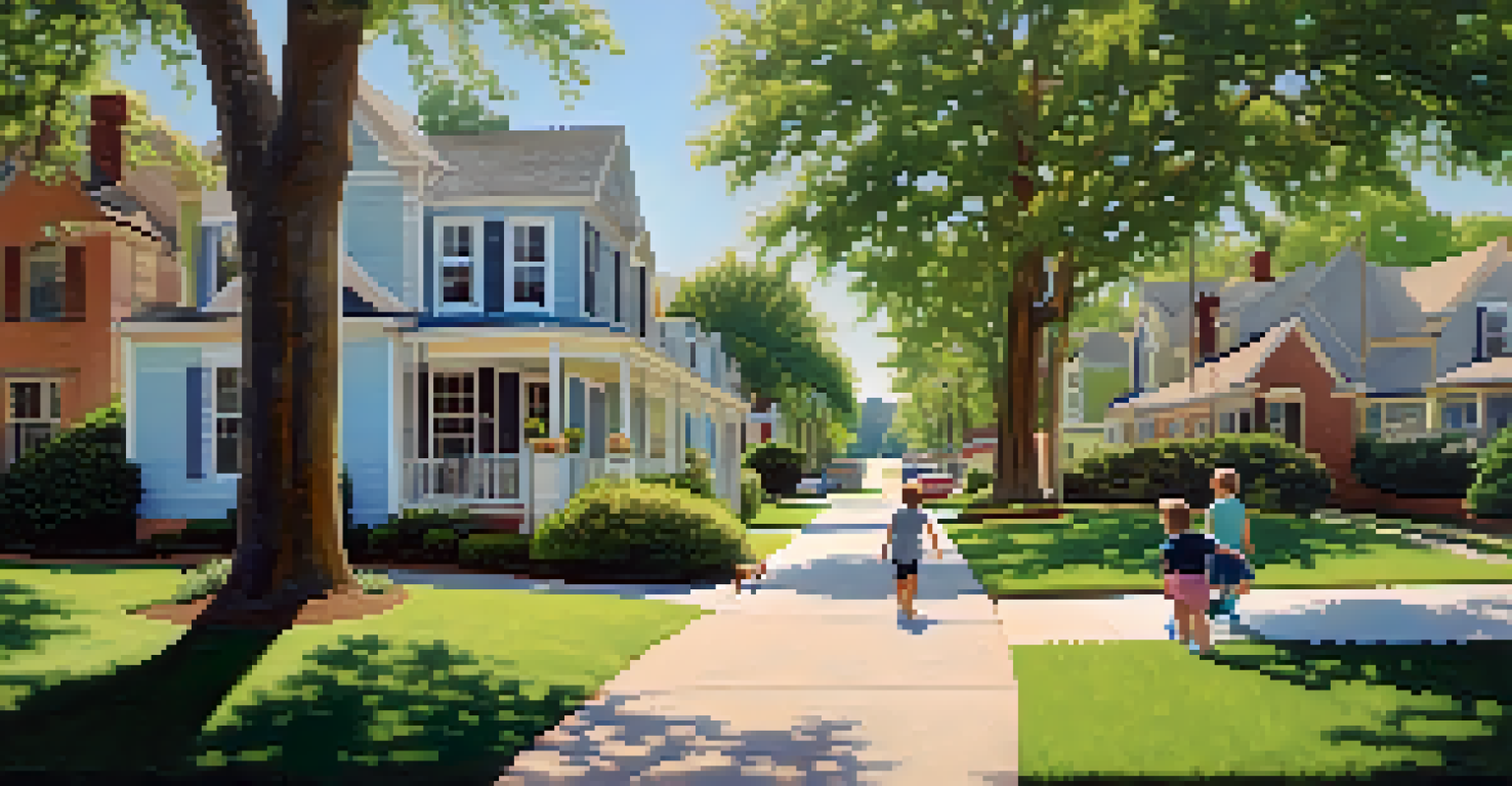Emerging Real Estate Trends Transforming Atlanta Housing Market

Shift Towards Sustainable and Green Living Spaces
Atlanta is witnessing a significant shift towards sustainable living, as more buyers prioritize eco-friendly homes. The growing awareness of environmental issues has led developers to incorporate green technologies, such as solar panels and energy-efficient appliances, into new constructions. For instance, neighborhoods like East Atlanta Village are becoming hubs for energy-efficient homes, attracting environmentally conscious buyers who want to reduce their carbon footprint.
Sustainability is no longer a trend; it's a way of life that resonates with the values of today's homebuyers.
This trend not only caters to the values of modern homebuyers but also enhances property values in the long run. Homes with sustainable features often sell for higher prices, as buyers are willing to invest in energy savings and lower utility costs. Plus, local governments are incentivizing these developments through tax breaks and grants, making it a win-win situation for both builders and homeowners.
Furthermore, the appeal of green living aligns perfectly with Atlanta's vibrant culture, where community gardens and urban farms are increasingly popular. As more people seek a lifestyle that emphasizes sustainability, the demand for these types of homes will only continue to grow, transforming the housing market in the process.
Rise of Mixed-Use Developments in Urban Areas
Mixed-use developments are reshaping the housing landscape in Atlanta by combining residential, commercial, and recreational spaces. These projects promote a sense of community, allowing residents to live, work, and play without the need for long commutes. A prime example is the Ponce City Market, which beautifully blends retail, dining, and residential units in a historic building, fostering a vibrant atmosphere.

This trend is particularly appealing to younger generations, such as millennials and Gen Z, who prioritize convenience and a lively neighborhood over traditional suburban living. Developers are responding to this demand by creating more walkable areas filled with shops, cafes, and parks, which not only enhances the quality of life but also drives economic growth in these regions.
Shift to Sustainable Living
Atlanta buyers are increasingly prioritizing eco-friendly homes with sustainable features like solar panels.
Moreover, mixed-use developments help alleviate some of the traffic issues that Atlanta has struggled with for years. By creating neighborhoods where everything is within walking distance, residents are less dependent on cars, which contributes to a more sustainable urban environment.
Increased Interest in Suburban Living Post-Pandemic
The COVID-19 pandemic has sparked a noticeable shift in housing preferences, with many Atlanta residents moving to suburban areas in search of more space and a slower pace of life. As remote work becomes more common, families are prioritizing larger homes with yards, making suburbs like Alpharetta and Roswell increasingly attractive. This trend has led to a surge in demand for suburban properties, pushing up prices in these areas.
The future of urban living lies in mixed-use spaces that foster community and reduce our reliance on cars.
Additionally, the desire for better outdoor amenities, such as parks and trails, has become a significant factor in home buying decisions. Suburban neighborhoods that offer ample green space and recreational opportunities are seeing a boom in interest from buyers looking to escape the hustle and bustle of city life. This is particularly true for families who want to provide a safe environment for their children.
As the trend continues, developers are responding by building more family-friendly communities that cater to these lifestyle changes. This includes not only single-family homes but also townhomes and condominiums that offer a balance of space and affordability, further transforming the Atlanta housing market.
Technology's Impact on Home Buying and Selling
Technology is revolutionizing the way homes are bought and sold in Atlanta. From virtual tours to digital closings, real estate transactions are becoming more streamlined and efficient. Buyers can now explore properties from the comfort of their own homes, which has made the search process easier and less time-consuming.
Moreover, the use of data analytics is helping real estate agents better understand market trends and consumer preferences. By leveraging tools that analyze local housing data, agents can provide clients with tailored recommendations, ensuring they find the right home at the right price. This data-driven approach is not just a trend; it’s becoming the new standard in real estate.
Mixed-Use Developments Thrive
Mixed-use projects in Atlanta, such as Ponce City Market, are creating vibrant communities where residents can live, work, and play.
Additionally, platforms that facilitate direct communication between buyers and sellers are gaining traction. This increased transparency in the buying process builds trust and confidence among prospective homeowners, ultimately leading to quicker and more successful transactions.
The Growth of Affordable Housing Initiatives
As Atlanta's housing market continues to evolve, there is a growing emphasis on affordable housing initiatives to address the increasing cost of living. Local governments and nonprofits are collaborating to create programs that provide financial assistance and incentives for developers to build affordable units. This is crucial in a city where rising property prices can push lower-income families out of their neighborhoods.
One notable initiative is the inclusionary zoning policy, which mandates that a portion of new developments be set aside for affordable housing. This approach ensures that as the city grows, it remains accessible to a diverse range of residents, preserving the rich cultural fabric of Atlanta.
Furthermore, community land trusts are gaining popularity as a means of promoting long-term affordability. By allowing communities to collectively own and manage land, these trusts help prevent displacement and ensure that housing remains affordable for generations to come. Such initiatives are essential for fostering inclusivity in Atlanta's real estate landscape.
The Impact of Urban Revitalization Projects
Urban revitalization is breathing new life into Atlanta's older neighborhoods, attracting new residents and businesses alike. Projects aimed at improving infrastructure, public spaces, and transportation options are transforming areas that were once overlooked. For example, the BeltLine project, which repurposes old railway corridors into multi-use paths, has sparked a renaissance in surrounding neighborhoods, making them highly desirable places to live.
These revitalization efforts not only enhance property values but also contribute to a sense of community pride. As neighborhoods become more vibrant, they attract new businesses, restaurants, and entertainment options, further enhancing the appeal of living in these areas. This creates a positive feedback loop where improved amenities lead to increased demand, making urban living more attractive.
Suburban Living Gains Popularity
Post-pandemic, many Atlanta residents are moving to suburbs for larger homes and a slower pace of life.
Additionally, urban revitalization often incorporates historical preservation, ensuring that the unique character of Atlanta’s neighborhoods is maintained. This blend of modern development and historical charm creates a rich tapestry that appeals to a wide range of homebuyers, from young professionals to families.
The Role of Remote Work in Housing Choices
The shift to remote work has had a profound effect on the housing choices of Atlanta residents. As companies embrace flexible work arrangements, many employees are no longer tethered to their offices, allowing them to consider homes in areas further from the city center. This newfound freedom has led to a surge in interest in suburban and rural properties, where buyers can find larger homes at more affordable prices.
This trend is reshaping the demand for housing types; for example, homes with dedicated office spaces are becoming increasingly sought after. Buyers are looking for layouts that accommodate not only their family’s needs but also their work-from-home arrangements, creating a new standard in home design. Developers are responding by incorporating home offices and multi-functional spaces into their plans.

Moreover, the flexibility of remote work has prompted many to reevaluate their lifestyle choices, leading to an increased interest in communities that offer a blend of tranquility and accessibility. As a result, neighborhoods that provide a balance of urban convenience and suburban serenity are becoming hot spots in Atlanta’s housing market.